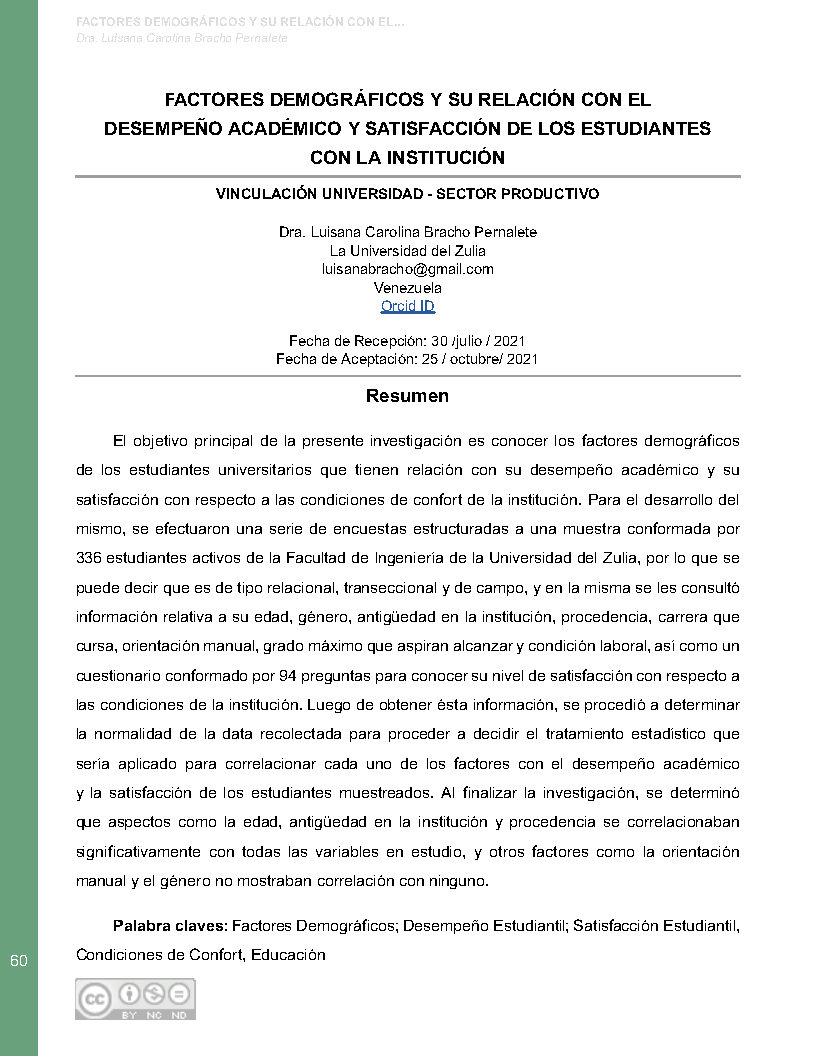Demographic factors and how they are related with academic performance and students' satisfaction with the institution
Keywords:
Demographic Factors, Students' Performance, Students' Satisfaction, Conditions of Comfort, EducationAbstract
The main objective of this research is to recognize the demographic factors of university students related to their academic performance and their satisfaction regarding the conditions of comfort available at the institution. To undertake the study, structured interviews were carried out with a sample of 336 active students from the Faculty of Engineering of the University of Zulia. In this regard, it may be classified as a relational, cross-sectional, and field study. Information regarding their age, sex, seniority in the institution, origin, career, manual orientation, the maximum degree they aspire to achieve, and work conditions were requested. A questionnaire made up of 94 questions to know their level of satisfaction with the institution was also applied. After obtaining this information, the normality of the data collected was calculated to decide then the statistical treatment that would be used to correlate each of the factors with the academic performance and satisfaction of the students sampled. At the end of the research, it was determined that aspects such as age, seniority in the institution, and origin were significantly correlated with all the variables being studied. Meanwhile, other factors such as manual orientation and gender did not show any correlations.
Downloads
References
Cascón, I. (2000). Análisis de las calificaciones escolares como criterio de rendimiento académico. En red. Recuperado de: https://campus.usal.es/~inico/investigacion/jornadas/jornada2/comun/c17.html.
Castañeda, M.; Cabrera, A.; Navarro, Y. y de Vries, W. (2010). Procesamiento de datos y análisis estadísticos utilizando SPSS. Un libro práctico para investigadores y administradores educativos. Porto Alegre Editorial ediPUCRS.
Cervantes, A.; Rivera, P. y De la Paz, J. Estadística Práctica para el análisis de datos (2004). Academia de Estadística y Computo Científico. Universidad Nacional Autónoma de México. Facultad de Estudios Superiores.
Edel Navarro, R. (2003). El rendimiento académico: concepto, investigación y desarrollo. Revista Electrónica Iberoamericana sobre Calidad, Eficacia y cambio en Educacion. Vol 1, No. 2.
Ferreyra, M. (2007). Determinantes del desempeño universitario. Efectos heterogéneos de un modelo censurado. Universidad de la Plata Tesis de maestría en economía. Argentina. Recuperado de: http://www. aaep. org. ar/anales/works/works2007/ferreyra. pdf.
Garbanzo, G. M. (2014). Factores asociados al rendimiento académico tomando en cuenta el nivel socioeconómico: Estudio de regresión múltiple en estudiantes universitarios. Revista Electrónica Educare. Vol 18. No. 1, pp. 119-154. Recuperado de http://www.revistas.una.ac.cr/index.php/EDUCARE/issue/current
Gento Palacios, S., Vivas García, M. (2003) El SEUE: un instrumento para conocer la satisfacción de los estudiantes universitarios con su educación. Acción Pedagógica, Vol.12, N° 2. pp. 16 – 27.
González-Peiteado, M., Pino-Juste, M., & Penado Abilleira, M. (2017). Estudio de la satisfacción percibida por los estudiantes de la UNED con su vida universitaria. RIED: Revista Iberoamericana de Educación a Distancia. Vol. 20. No. 1. Pp. 243-260. Doi: 10.5944/ried.20.1.16377
Iglesias, L. y Vera, V. (2010) Factores psicológicos, sociales y demográficos asociados al rendimiento académico en estudiantes universitarios. Revista de Psicología. Vol. 12. No. 1. Pp. 216 – 236.
Issa, M., Rankin, J., Attalla, M., Christian, A. (2011) Absenteeism, performance and occupant satisfaction with the indoor environment of green Toronto schools. Indoor and Built Environment. Vol 2011. No. 20; 5. pp 511 - 523.
Izar, J., Ynzunza, C. y Lopez, H. (2011) Factores que afectan el desempeño académico de los estudiantes de nivel superior en Rioverde, San Luis Potosí, México. Revista de Investigación Educativa. Vol. 12. pp. 1 – 18.
Jano, D. y Ortiz, S. (2005) Determinación de los factores que afectan al rendimiento académico en la educación superior. XII Jornadas de la Asociación de Economía de la Educación. Oviedo. s/v. s/p.
Jiménez, M. (2000). Competencia social: intervención preventiva en la escuela. Infancia y Sociedad. Vol 24. pp. 21- 48.
Juran, J. (2007) “Método Juran: Análisis y Planeación de la Calidad”. 5ta Edición. México. Editorial Mc Graw-Hill.
Kemmilaa, S. y Loonnqvist. (2003). Subjective Productivity Measurement. Journal of the American Academy of Business.Vol. 2. No. 2. pp. 531–37.
Navarro Asencio, E. (2015) Guía para la interpretación de resultados en el contraste de hipótesis estadísticas. Revista Eduktive. Versión 5.
Price, I., Matzdorf, F., Smith, L., Agahi, H. (2003) The impact of facilities on student choice of university. Facilities. Vol 21. No. 10. pp. 212 - 222.
Rubio, M. & Berlanga, V. (2012) Cómo aplicar las pruebas paramétricas bivariadas t de Student y ANOVA en SPSS. Caso práctico. REIRE, Revista d’Innovació I Recerca en Educació. Vol. 5. No. 2. pp. 83-100.


